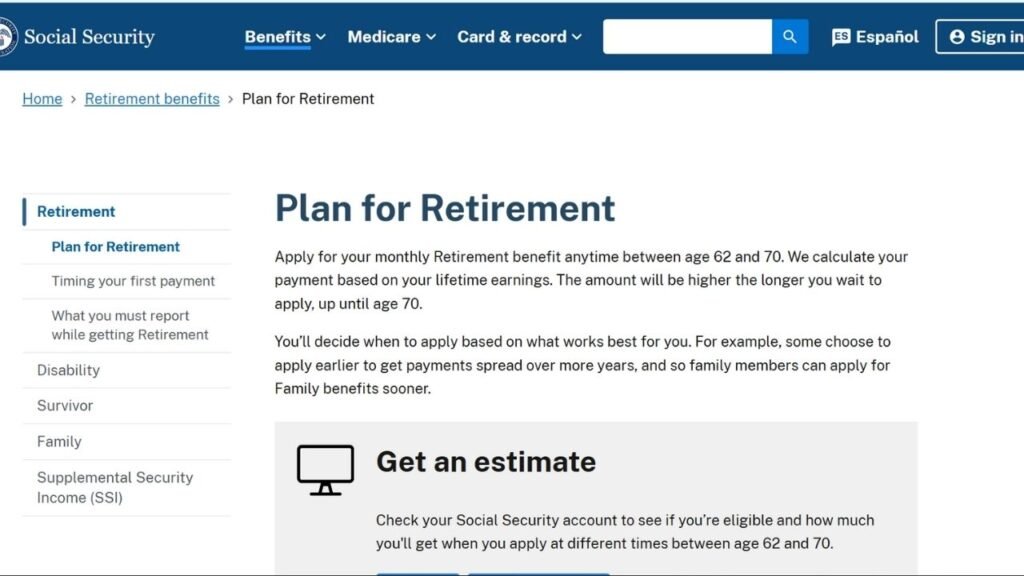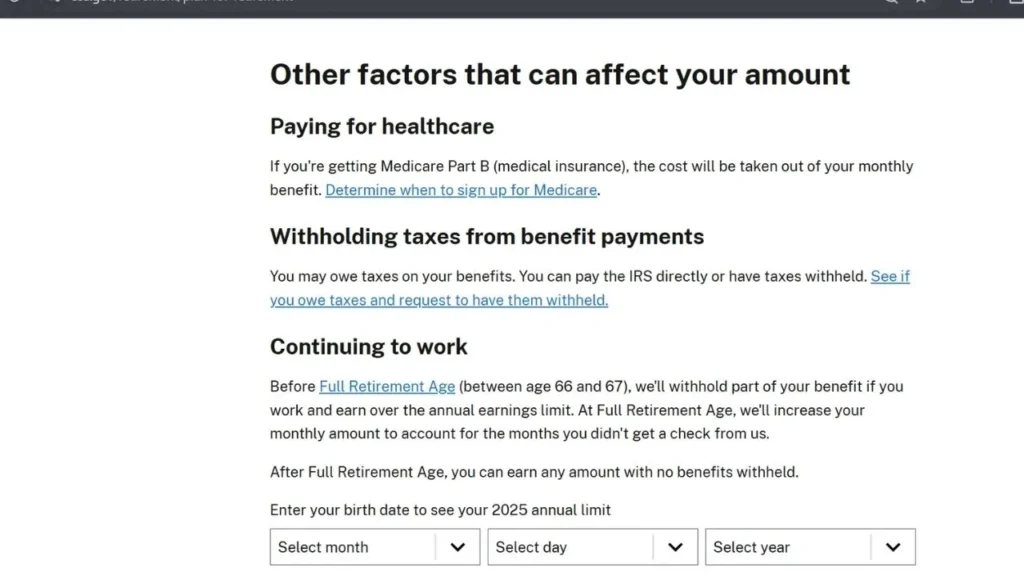Social Security Retirement Age 2025: If you’re like most Americans, you probably grew up thinking 67 was the magic number for retirement. It’s been the standard full retirement age for years, shaping how people plan their careers, savings, and golden years. But that familiar number may soon become a thing of the past. Rising life expectancy and growing pressure on Social Security funding are leading to big changes. The Social Security Retirement Age 2025 discussion is no longer theoretical—it’s happening right now, and it could affect how long you need to work.

The Social Security Retirement Age 2025 reforms could change retirement as we know it. Policymakers are now proposing raising the full retirement age to 68, 69, or even 70, particularly for younger workers. These changes are meant to keep Social Security solvent beyond 2035, but they also mean many Americans may need to stay in the workforce longer than planned.
Social Security Retirement Age 2025 – What’s the Real Impact?
The potential changes tied to the Social Security Retirement Age 2025 are already sparking concern among younger workers and financial planners. If the full retirement age rises, millions could see reduced benefits for early retirement and fewer options for leaving the workforce at a traditional age. This means more pressure to save independently, work longer, and rethink retirement timelines.

People born in 1960 or later already face a full retirement age of 67. If proposals go through, future generations may have to wait until 68–70 to receive their full Social Security benefits. In short, this isn’t just a shift in policy—it’s a major financial wake-up call for the entire workforce.
Overview: Social Security Retirement Age 2025
| Category | Details |
| Current Full Retirement Age | 67 (for those born 1960 or later) |
| Proposed Full Retirement Age | 68–70 (based on birth year) |
| Trust Fund Status | Projected depletion by 2034–2035 |
| Post-2035 Benefit Payment | ~77% of promised benefits if unreformed |
| Options Being Considered | Raise FRA, increase payroll tax, means testing |
| Who Is Most Affected | Workers under 50, especially Gen Z & Millennials |
| Claiming at 62 (New FRA) | Could reduce benefits by up to 40% |
History of Social Security and Retirement Age in the U.S.
Social Security began in 1935 with a full retirement age of 65—at a time when the average life expectancy was only 61. Over the decades, as people started living longer, the government adjusted the system. In the 1980s, the retirement age was increased gradually to 67 for those born in 1960 or later.
Now, as the number of retirees outpaces the number of workers paying into the system, another adjustment seems inevitable. The idea behind increasing the retirement age again is simple: people are living longer, collecting benefits longer, and the system is running out of money.
Why Policymakers Want to Raise the Age Beyond 67?
The short answer? Funding. According to the latest Social Security Trustees Report, the program will only be able to pay about 77% of scheduled benefits by 2035 if no changes are made. That’s why increasing the Social Security Retirement Age 2025 is on the table—it’s one of the least politically painful ways to stretch funding over time.
Other proposed fixes include raising the payroll tax rate, removing the income cap, or reducing benefits for higher-income Americans. But increasing the retirement age impacts future retirees gradually, which is why many lawmakers see it as a more acceptable option.
What the New Retirement Age Could Look Like
Here’s how the phased changes could impact different age groups based on proposed updates to the Social Security Retirement Age 2025:
| Year of Birth | Current FRA | Proposed FRA |
| 1960 or later | 67 | 68 |
| 1970 or later | 67 | 69 |
| 1980 or later | 67 | 70 |
These new thresholds mean younger Americans may not see full Social Security benefits until their 70s. Early retirement at 62 would still be allowed, but with steeper reductions.
What This Means for Your Social Security Benefits
Let’s break this down with numbers. Under today’s system:
- Retiring at 62 means a 30% reduction in benefits.
- Retiring at 67 gives you full benefits.
- Retiring at 70 boosts your benefits by about 24–32%.
If the Social Security Retirement Age 2025 shifts to 70:
- Retiring at 62 could result in a 40% reduction.
- Full benefits would only be available at 70.
- Delaying past 70 would provide minimal additional increase.
This puts early retirees in a difficult position, especially those with physically demanding jobs who may not be able to work that long.
Who Will Be Affected the Most?
Not all Americans will feel this shift equally. Here’s who’s likely to face the biggest challenges:
- Younger workers (under 50): These groups will face the new retirement ages head-on.
- Low-income workers: People in physical jobs are less likely to work into their 70s, making reduced early benefits a bigger burden.
- Women: With higher life expectancies, they may be more exposed to the long-term effects of delayed benefits.
- High earners: Less impacted due to private savings and investment portfolios.
- Older workers (55 and older): Less likely to be affected, though reforms could still change taxes or cost-of-living adjustments.
How to Prepare If Retirement Age Increases?
Whether or not you agree with raising the Social Security Retirement Age 2025, one thing is clear: you need a backup plan.
1. Start Saving Now
Boost your 401(k), IRA, or Roth contributions. Time is your biggest asset.
2. Build Multiple Income Streams
Consider passive income through stocks, real estate, or freelance work in retirement.
3. Delay Claiming Benefits
If you can, wait. Each year you delay past full retirement age adds about 8% to your benefit.
4. Plan to Work Longer—on Your Terms
Part-time work, remote jobs, and flexible gigs can help ease the burden of a delayed FRA without burning out.
The Bigger Picture: Why This Change Matters
By 2030, every Baby Boomer will be over 65. At the same time, the number of workers supporting Social Security is shrinking. In 1960, the ratio was 5:1. By 2035, it will be closer to 2:1. These numbers simply don’t support the current structure of the program.
The Social Security Retirement Age 2025 changes reflect a necessary adaptation to new demographics and economic realities. Still, it’s up to each of us to adjust and plan accordingly.
Pros and Cons of Raising the Retirement Age
Pros:
- Extends the solvency of Social Security
- Aligns with increased life expectancy
- Encourages long-term financial planning
Cons:
- Hurts those in labor-intensive jobs
- Increases retirement inequality
- May force people to work beyond their physical capacity
Generational Impact: Who Wins and Who Loses?
| Generation | Born Between | Impact Level |
| Baby Boomers | 1946–1964 | Low – Most already retired |
| Gen X | 1965–1980 | Medium – FRA may rise slightly |
| Millennials | 1981–1996 | High – Likely to retire at 70 |
| Gen Z | 1997–2012 | Very High – Could face toughest path to retirement |
Conclusion: The End of Retirement at 67
The phrase “Goodbye to retirement at 67” may soon be a reality. The Social Security Retirement Age 2025 proposals are more than policy changes—they’re a shift in how Americans think about aging, working, and planning for the future. While full benefits will still be available, the age at which you receive them may continue to rise.
Now’s the time to act. Build savings, stay informed, and prepare to be flexible. Retirement isn’t disappearing—it’s just being redefined.
FAQs
Q1: Will current retirees lose benefits under the new rules?
No, current retirees and those close to retirement are expected to be protected from major changes.
Q2: Can I still retire at 62 if the retirement age increases?
Yes, but your benefits could be reduced by as much as 40% if the new FRA becomes 70.
Q3: Is Social Security going away completely?
No. Even if reforms don’t happen, the system can still pay 77% of benefits after 2035.
Q4: What can I do if I’m in a physically demanding job?
Start saving more now, explore disability benefits if needed, or consider transitioning to less physically intense work.
Q5: Is it still smart to delay claiming Social Security?
Yes. Delaying benefits can significantly increase your monthly payments, especially if FRA increases.
